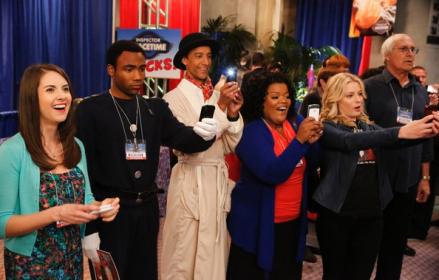As a fan of both Community and Dr. Who, “Conventions of Space and Time” should have been an easy sell. The very premise denoted a showcase for Community’s previously clever handling of the imaginary British series so beloved that it has its own actual-world fan-written canon. But instead, I’ll remember this episode as the moment when Community’s self-reflexive humor became an ouroboros. It began to consume itself.
Said cannibalism was most visible in a focus group subplot that also served as this week’s game of “how can the writers physically isolate Chevy Chase from the rest of the cast?” In it, Chase’s Pierce and Shirley are poached from a crowd of actual Inspector fans at the convention and asked to test an American version of the series. Pierce, predictably, goes power-mad and insists that a show about an inspector who can travel in space and time would be better if the networks removed all that confusing space and time travel (and added a “blonde with long legs and a tennis racket”). Meanwhile Shirley tries to restore balance to the world with her memorable defense of the original British show, speculating that Inspector fans love the unusual series so much because it’s “smart, complicated and doesn’t talk down to its audience.”
The focus group is an obvious comment on what Community fans want and don’t want from the show—their hopes and fears as the series continues without its creator and mastermind. But Shirley’s commentary on the fans’ behalf is a slingshot in a gunfight, a battle lost as soon as the network decided to test their new series on desirable demographics instead of on the people who were most likely to enjoy the show. Likewise, Community has failed to escape its own self-reflection this season so far by wrongly guessing that the worst-case scenario for the show is for it to “sell out” to the whims of a Pierce-like audience. That’s an obvious way for a show to go from good to mediocre. Community isn’t adding a blonde with long legs and a tennis racket. Instead, Community is still writing for its core audience, but it’s given in to the notion that clever references, a committed ensemble cast and writing room, and the absence of a laugh track are enough to keep the show feeling like itself.
The jokes and comedic performances aren’t the glue that holds the show together. If that were the case, “Conventions of Space and Time” wouldn’t have been all that bad: Donald Glover’s delivery of lines like “Good morning, Britta, I haven’t seen you in over 12 hours” were spot-on; Alison Brie gamely sold Annie’s creepy subplot of playing house as Jeff’s “wife”; and Britta’s fascination with the unlikeable Minervia incarnation of the Inspector was clever. But Community’s humor, being a “smart, complicated” show that “doesn’t talk down to its audience,” relies on a foundation of good, human storytelling.
Community, like Dr. Who, is at its best when it creates entire universes within the familiar. In Dr. Who the alien “Doctor” flies a spaceship and time machine disguised as a police box (it’s a red telephone booth in Inspector Spacetime) that, as first-time visitors always seem to note with shock, is “bigger on the inside.” At least in the newer Dr. Who episodes, the “Doctor” and his “companions” zip between a Great Britain nearly identical to the real one and the astonishing diversity and complexity of life imagined beyond our gravity field. Sometimes, the familiar and fictional collide, suggesting that even what seems mundane and ordinary can contain entire worlds within.
Abed’s imagination, and the show’s related propensity for taking stylistic risks, has served a similar purpose for Community. As Aisha noted, “Conventions of Space and Time” covered familiar territory for the show—the tensions in Abed’s friendship with Troy as time marches on. But that story’s been told better in other episodes. Under Harmon, the show was able to make an epic poem out of a pillow fight, finding room for the touchingly human in what was otherwise just a really good extended joke. Once upon a time, Community was bigger on the inside.
